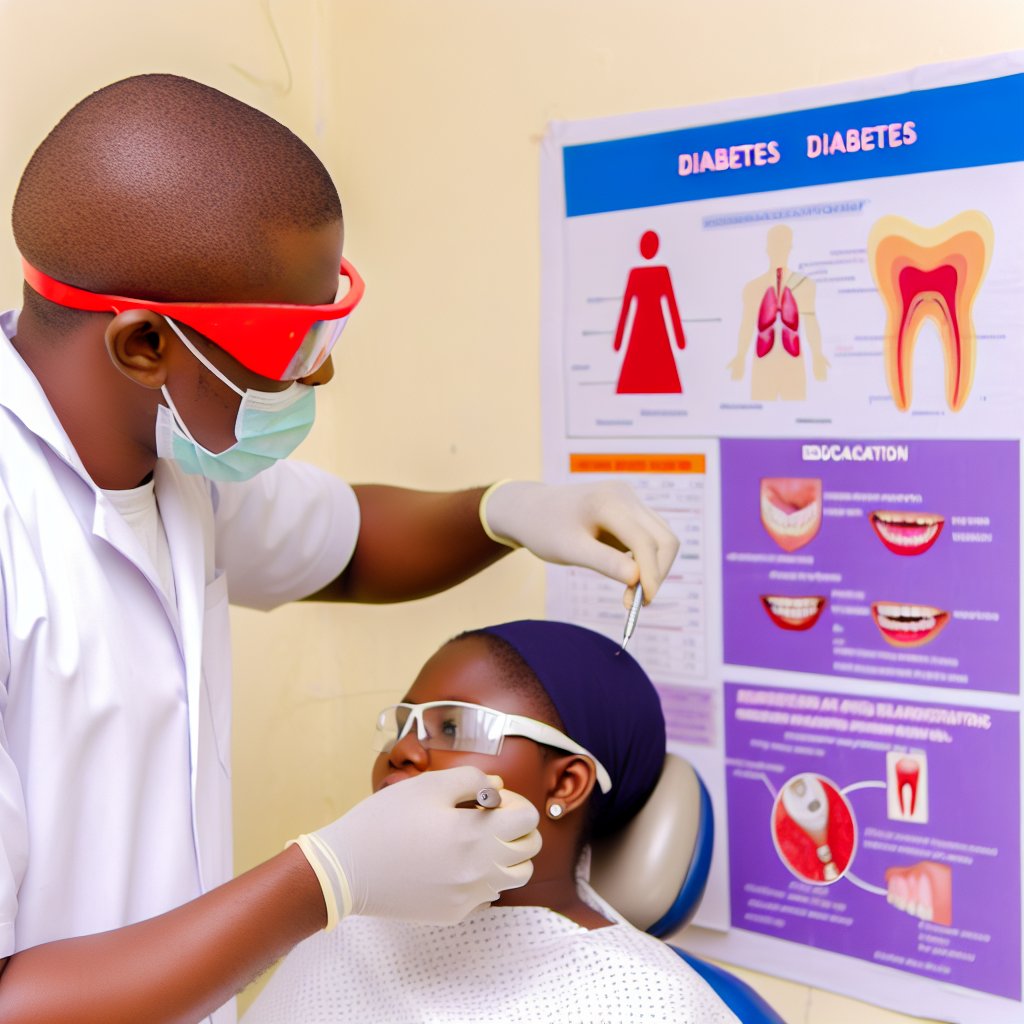Introduction:
Preventive dentistry and diabetes management are crucial for overall health.
There is a direct link between oral health and diabetes.
Taking care of your teeth can help in managing diabetes effectively.
Regular dental check-ups and proper oral hygiene are essential.
Individuals with diabetes are more prone to oral health issues.
Maintaining good oral health can also help in controlling blood sugar levels.
Preventive dentistry plays a significant role in preventing dental complications.
Proper management of diabetes can improve oral health outcomes.
By understanding the connection between oral health and diabetes, individuals can take proactive measures.
Preventive care and management strategies are key in promoting overall well-being.
The link between diabetes and oral health:
Diabetes can lead to a variety of oral health issues due to elevated blood sugar levels.
Individuals with diabetes are more prone to gum disease, which can lead to tooth loss if left untreated.
People with diabetes have a higher likelihood of developing cavities, especially if blood sugar levels are not well-controlled.
Diabetes can cause dry mouth, which increases the risk of tooth decay and other oral health problems.
Diabetes can slow down the body’s ability to heal, making it harder to recover from oral surgery or gum disease treatment.
Nerve damage from diabetes can affect sensation in the mouth, leading to problems like difficulty chewing or speaking.
Regular dental check-ups play a crucial role in managing diabetes by:
- Preventing oral health complications associated with diabetes
- Detecting early signs of gum disease and other dental issues
- Ensuring overall oral health and hygiene
The significance of preventive dental care for individuals with diabetes
Individuals with diabetes are more prone to oral health problems such as gum disease, cavities, and infections.
Maintaining good oral hygiene through regular check-ups and cleanings is essential in preventing these issues from worsening.
The role of dentists in detecting early signs of oral health issues related to diabetes
Dentists play a crucial role in identifying early signs of dental problems that may be linked to diabetes.
They can detect symptoms such as bleeding gums, dry mouth, and oral infections that may indicate uncontrolled blood sugar levels.
Regular dental check-ups are essential for individuals with diabetes to prevent serious oral health complications.
Dentists can provide personalized care and guidance on managing oral health while living with diabetes.
By visiting the dentist regularly, individuals can maintain good oral hygiene practices that can help control blood sugar levels.
This will reduce the risk of developing more severe dental issues.
Early detection of oral health problems related to diabetes can lead to timely intervention and treatment.
It prevents the progression of gum disease, tooth loss, and other complications.
Furthermore, dentists can work closely with individuals with diabetes to create a customized treatment plan.
This plan addresses their specific oral health needs and concerns.
Regular dental check-ups are an integral part of diabetes management.
They promote good oral health and contribute to better overall health and well-being.
See Related Content: Importance of Orthopaedic Tech in Nigerian Healthcare
When it comes to managing diabetes and maintaining good oral health, there are several tips that can help individuals with diabetes stay on top of their oral hygiene.
Here are some practical tips:
Oral Hygiene Practices
- Brush your teeth at least twice a day with a soft-bristled toothbrush to remove plaque and prevent cavities.
- Floss daily to clean between teeth and along the gumline where your toothbrush may not reach.
- Rinse with an antimicrobial mouthwash to reduce bacteria and freshen breath.
Controlling Blood Sugar Levels:
Controlling Blood Sugar Levels
- Keep track of your blood sugar levels regularly to ensure they are within the target range.
- Eat a balanced diet with low sugar and carbohydrates to help maintain stable blood sugar levels.
- Take your diabetes medication as prescribed to manage your blood sugar effectively.
By following these tips for maintaining good oral health, individuals with diabetes can prevent oral health issues and promote overall well-being.
Remember, good oral health is an essential part of diabetes management.
You Might Also Like: Influence of Traditional Medicine on Nigerian Veterinary
Dietary recommendations for preventing dental issues in individuals with diabetes:
Impact of diet on oral health, especially for individuals with diabetes:
The foods you consume can directly impact your oral health, especially if you have diabetes.
High-sugar and high-carbohydrate foods can lead to tooth decay and gum disease.
Transform Your Career with Expert Guidance
Get personalized mentorship consulting that’s tailored to your unique path. Our expert advice is actionable and exclusive.
Get StartedIndividuals with diabetes are more prone to oral health issues due to fluctuations in blood sugar levels.
Uncontrolled diabetes can weaken your immune system, making you more susceptible to infections.
Guidance on choosing foods that are beneficial for both dental health and diabetes management:
- Opt for nutrient-rich foods that are low in sugar and carbohydrates to maintain good oral health.
- Incorporate plenty of fruits and vegetables into your diet to boost your immune system and promote overall health.
- Choose whole grains over refined grains to help stabilize blood sugar levels and reduce the risk of cavities.
- Consider foods rich in calcium, such as dairy products, leafy greens, and almonds, to strengthen teeth and bones.
- Drink plenty of water throughout the day to wash away food particles and bacteria that can cause cavities.
- Limit your intake of sugary beverages and snacks, as they can contribute to tooth decay and gum disease.
- Avoid sticky and chewy candies that can cling to your teeth and promote plaque buildup.
- Brush your teeth at least twice a day and floss daily to remove plaque and prevent tooth decay and gum disease.
- Schedule regular dental check-ups and cleanings to detect any oral health issues early and prevent complications.
- Work with your dentist and healthcare provider to develop a comprehensive dental care plan tailored to your specific needs.
Find Out More: Continuing Education for Nigerian Radiographers

The Role of Lifestyle Changes in Preventing Dental Problems for Individuals with Diabetes:
Highlight the importance of quitting smoking and reducing alcohol consumption for oral health.
Discuss the benefits of regular exercise and stress management in preventing dental issues.
Quitting Smoking and Reducing Alcohol Consumption:
Smoking and excessive alcohol consumption can have detrimental effects on oral health.
Individuals with diabetes are already at a higher risk for dental problems, so avoiding these habits is crucial.
Smoking can lead to gum disease and oral cancer, while alcohol can contribute to dry mouth, which increases the risk of cavities.
Quitting smoking and reducing alcohol consumption can significantly improve overall oral health in individuals with diabetes.
Regular Exercise and Stress Management:
Exercise plays a vital role in preventing dental issues by improving circulation, which promotes healthy gums.
Regular physical activity can also help regulate blood sugar levels, reducing the risk of infections in the mouth.
Stress management techniques, such as meditation and yoga, can lower stress levels that can contribute to oral health problems.
Chronic stress weakens the immune system, making individuals more susceptible to gum disease and other oral issues.
Lifestyle Changes for Better Dental Health:
Lifestyle changes such as quitting smoking, reducing alcohol consumption, regular exercise, and stress management are essential in preventing dental problems for individuals with diabetes.
By incorporating these habits into daily life, individuals can significantly improve their oral health and overall well-being.
Uncover the Details: Radiological Sciences: Patient Interaction Tips
Importance of Preventive Dentistry for People with Diabetes
Preventive dentistry is crucial for maintaining oral health and preventing complications related to diabetes.
It involves regular dental check-ups, proper oral hygiene practices, and early intervention to address any dental issues promptly.
Managing diabetes is essential not only for blood sugar control but also for preventing gum disease and other oral health problems.
By maintaining good oral hygiene habits and controlling blood sugar levels, individuals can significantly reduce the risk of developing dental issues associated with diabetes.
Both preventive dentistry and diabetes management play a vital role in promoting overall health and well-being.
It is essential to prioritize these aspects of health to prevent serious complications and improve quality of life.
Additional Resources
Awareness and Oral Self-Care Practices of Diabetic Patients at a …
Prevalence of periodontitis and oral hygiene practices among …




